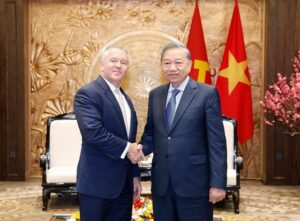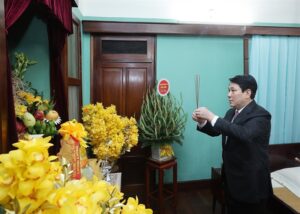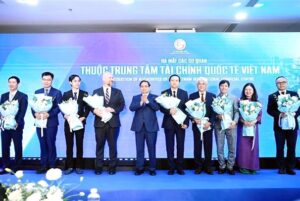Prime Minister Chính Engages Policy Advisory Council on Economic Stability and Governance Reform

Hanoi, The Gulf Observer: Prime Minister Phạm Minh Chính on Sunday held a working session with the Policy Advisory Council to review strategies for ensuring macroeconomic stability, stimulating consumer demand, and improving the two-tier local government system.
During the meeting, the Prime Minister outlined recent global developments, particularly shifts in major economies and their implications for Việt Nam. He reaffirmed the government’s commitment to achieving the nation’s long-term centennial goals through key programmes such as administrative reorganisation, local government reforms, and the enforcement of critical resolutions.
He highlighted transformative projects currently underway, including high-speed railways, intermodal rail systems, nuclear energy, an international financial hub, and a free trade center. Social welfare policies, he said, remain central to national development, with initiatives to construct one million social housing units, eliminate makeshift housing, expand border-area schools, provide free tuition, and ensure nutrition for students.
The Prime Minister reiterated Việt Nam’s ambitious growth targets of 8.3–8.5 per cent in 2025 and double-digit expansion in subsequent years. He stressed that achieving such goals requires breakthrough solutions, with the council serving as a vital channel for expert input.
Council members acknowledged the country’s macroeconomic stability but flagged challenges in areas such as exchange rates, gold prices, the stock market, and real estate. They urged a careful balance between growth and risk control, with emphasis on safety, inclusiveness, and sustainability. Recommendations included stimulating consumption through fiscal and monetary measures, renewing growth drivers, and strengthening both supply and demand sides.
Regarding the two-tier government model, members suggested clearer workflows, training for local-level officials, citizen-friendly guides, and pilot inter-commune administrative models in former urban areas to enhance coordination of essential services. Household businesses—accounting for nearly 25 per cent of GDP—were recognised as a vital sector requiring supportive, gradual policy adjustments.
The Prime Minister welcomed the council’s proposals, particularly on adapting to US tariff policies through market diversification, export restructuring, outbound investment, and deeper integration into global supply chains. He also underscored real estate’s role as a growth driver while highlighting the need for legal reforms, fiscal measures, and incentives to balance luxury property oversupply with increased social housing.
He endorsed policies for sustainable growth, including expanded fiscal stimulus, flexible monetary management, enhanced productivity, and investment in science, innovation, and digital transformation. He called for boosting bond funding by 20–25 per cent to finance key projects and stressed proactive measures to stabilise exchange rates amid USD appreciation.
The Prime Minister further directed aggressive public investment, measures against speculation and smuggling, and stronger oversight of gold and currency markets. He advocated stabilising VND interest rates, promoting exports and tourism, and reducing business input costs to strengthen product competitiveness.
On local governance, he emphasised improving staff capacity, accelerating digital transformation, and shifting from management to service-oriented administration. He highlighted the importance of continuous training, resource allocation aligned with decentralisation, and grassroots-level digital literacy, stating: “A digital government and digital administration must be accompanied by digital citizens.”


